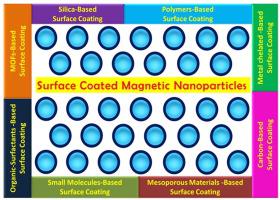Journal of Advanced Research ( IF 11.4 ) Pub Date : 2021-10-04 , DOI: 10.1016/j.jare.2021.09.013 Muhammad Bilal 1 , Hafiz M N Iqbal 2 , Syed Farooq Adil 3 , Mohammed Rafi Shaik 3 , Abdelatty Abdelgawad 4 , Mohammad Rafe Hatshan 3 , Mujeeb Khan 3

|
Background
Enzymes based bio-catalysis has wide range of applications in various chemical and biological processes. Thus, the process of enzymes immobilization on suitable support to obtain highly active and stable bio-catalysts has great potential in industrial applications. Particularly, surface-modified magnetic nanomaterials have garnered a special interest as versatile platforms for biomolecules/enzyme immobilization.
Aim of review
This review spotlights recent progress in the immobilization of various enzymes onto surface-coated multifunctional magnetic nanostructured materials and their derived nano-constructs for multiple applications. Conclusive remarks, technical challenges, and insightful opinions on this field of research which are helpful to expand the application prospects of these materials are also given with suitable examples.
Key scientific concepts of review
Nanostructured materials, including surface-coated magnetic nanoparticles have recently gained immense significance as suitable support materials for enzyme immobilization, due to their large surface area, unique functionalities, and high chemical and mechanical stability. Besides, magnetic nanoparticles are less expensive and offers great potential in industrial applications due to their easy recovery and separation form their enzyme conjugates with an external magnetic field. Magnetic nanoparticles based biocatalytic systems offer a wide-working temperature, pH range, increased storage and thermal stabilities. So far, several studies have documented the application of a variety of surface modification and functionalization techniques to circumvent the aggregation and oxidation of magnetic nanoparticles. Surface engineering of magnetic nanoparticles (MNPs) helps to improve the dispersion stability, enhance mechanical and physicochemical properties, upgrade the surface activity and also increases enzyme immobilization capabilities and biocompatibility of the materials. However, several challenges still need to be addressed, such as controlled synthesis of MNPs and clinical aspects of these materials require consistent research from multidisciplinary scientists to realize its practical applications.
中文翻译:

用于稳健生物催化和生物医学应用的表面涂层磁性纳米结构材料——综述
背景
基于酶的生物催化在各种化学和生物过程中具有广泛的应用。因此,将酶固定在合适的载体上以获得高活性和稳定的生物催化剂的过程在工业应用中具有巨大的潜力。特别是,表面改性的磁性纳米材料作为生物分子/酶固定的多功能平台引起了人们的特别兴趣。
审查目的
本综述重点介绍了将各种酶固定在表面涂覆的多功能磁性纳米结构材料及其衍生的用于多种应用的纳米结构上的最新进展。还通过适当的例子给出了有助于扩展这些材料的应用前景的结论性评论、技术挑战和对这一研究领域的深刻见解。
审查的关键科学概念
纳米结构材料,包括表面包覆的磁性纳米粒子,由于其大表面积、独特的功能以及高化学和机械稳定性,最近作为酶固定化的合适载体材料获得了巨大的意义。此外,磁性纳米颗粒更便宜,并且由于它们易于回收和从它们的酶缀合物中分离而在工业应用中提供了巨大的潜力 与外部磁场。基于磁性纳米粒子的生物催化系统提供广泛的工作温度、pH 范围、增加的存储和热稳定性。到目前为止,一些研究已经记录了各种表面改性和功能化技术的应用,以规避磁性纳米粒子的聚集和氧化。磁性纳米粒子(MNPs)的表面工程有助于提高分散稳定性,增强机械和物理化学性能,提升表面活性,还可以提高材料的酶固定能力和生物相容性。然而,仍有一些挑战需要解决,











































 京公网安备 11010802027423号
京公网安备 11010802027423号